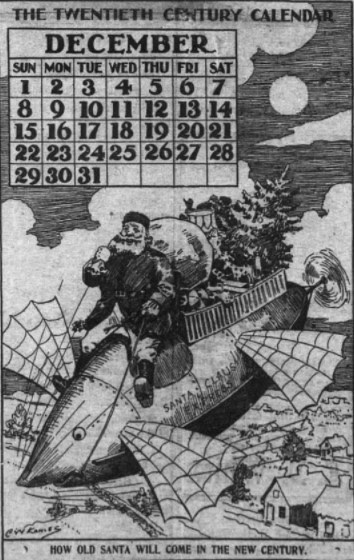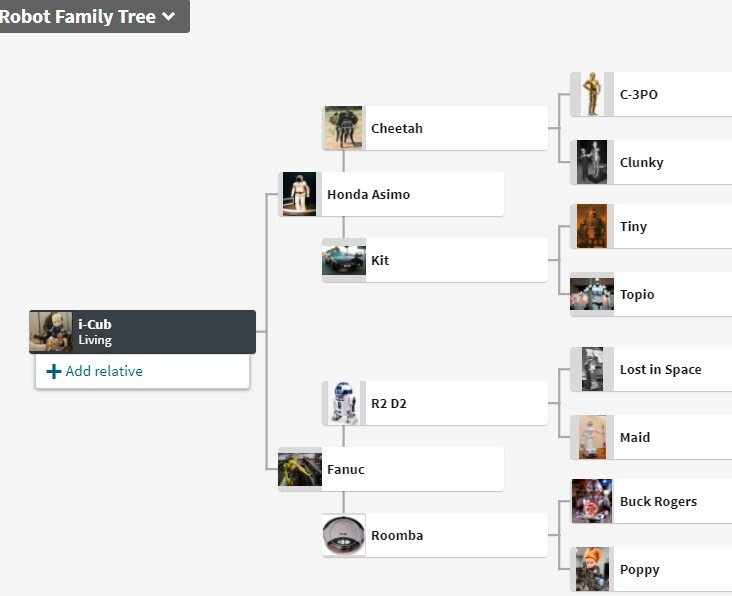11 Dec Genealogy research Newsletter- December 11, 2021
Contents
- 1
- 2 The above cartoon ran in 1901. Below are six of the many predictions from 1900 made for the next 100 years by John Elfreth Watkins. The first three came true; the next three did not.
- 3 Using DNA to identify the remains of the sailors killed aboard the USS Oklahoma at Pearl Harbor.
- 4 Scientists Successfully Built Tiny Robots That Can Reproduce on Their Own
- 5 Great Holiday gifts from Dancestors
- 6 Still need a stocking stuffer for Christmas?
The above cartoon ran in 1901. Below are six of the many predictions from 1900 made for the next 100 years by John Elfreth Watkins. The first three came true; the next three did not.
1. Digital color photography- Watkins did not, of course, use the word “digital” or spell out precisely how digital cameras and computers would work. Still, he accurately predicted how people would come to use new photographic technology.
2. Television- “Man will see around the world. Persons and things of all kinds will be brought within focus of cameras connected electrically with screens at opposite ends of circuits, thousands of miles at a span.” Watkins foresaw cameras and screens linked by electric circuits, a vision practically realized in the 20th Century by live international television and latterly by webcams.
3. Mobile phones- “Wireless telephone and telegraph circuits will span the world. A husband in the middle of the Atlantic will be able to converse with his wife sitting in her boudoir in Chicago. We will be able to telephone China quite as readily as we now talk from New York to Brooklyn.” International phone calls were unheard of in Watkins’ day. It was another 15 years before the first call was made, by Alexander Bell, even from one coast of the US to the other. Nevertheless, the idea of wireless telephony was genuinely revolutionary.
4. “There will be no C, X, or Q in our everyday alphabet. This was wrong, says Patrick Tucker of the World Future Society, but also remarkable in the way that it hints at the possible effects of mass communication on communication itself.
5. No more cars in large cities- “All hurry traffic will be below or above ground when brought within city limits.” However, many cities do have pedestrian zones in their historic centers. And he correctly forecasted elevated roads and subways.
6. No mosquitoes or flies- “Mosquitoes, houseflies, and roaches will be exterminated.”Watkins was getting ahead of himself here. Indeed the bed bug is making a massive comeback in the US and other countries. Maybe the end of the mosquito and the house fly is something to look forward to in 2100?
Here is the full article: https://www.bbc.com/news/magazine-16444966
 Using DNA to identify the remains of the sailors killed aboard the USS Oklahoma at Pearl Harbor.
Using DNA to identify the remains of the sailors killed aboard the USS Oklahoma at Pearl Harbor.
The USS Oklahoma disinterment and identification project at DPAA has succeeded in collectively accounting for all USS Oklahoma unaccounted-for personnel lost on the morning of Dec. 7, 1941, and we were able to individually identify 361 of the ship’s 394 unaccounted-for personnel who had remained unidentified after the post-war identification efforts. The success of the Oklahoma project has brought answers to these families and has also served as a milestone undertaking that has since helped shape and inform other successful disinterment projects within DPAA.
This process began in 2003 with the disinterment of a single casket of “unknown” USS Oklahoma remains, thought to contain the commingled remains of five individuals. Upon analysis by the DPAA Laboratory, this casket was determined to have contained partial remains of nearly 100 individuals, revealing the breadth of research and scientific work necessary to fully account for the Oklahoma’s missing Sailors and Marines. In 2009, after several years of policy discussions, the decision was made to request family reference DNA samples from relatives of every missing individual aboard the Oklahoma during the Pearl Harbor attack; in 2015, the remaining caskets of unknowns from the USS Oklahoma were disinterred.
Here are the facts:
https://dpaa-mil.experience.crmforce.mil/FactSheets/s/ussoklahoma
 Scientists Successfully Built Tiny Robots That Can Reproduce on Their Own
Scientists Successfully Built Tiny Robots That Can Reproduce on Their Own
Knowing how records get lost over time, I thought I would get a head start on preserving the family trees of robots. However, the second article below shows you that the Dutch have already built a robot to replace me 🙁
A team of scientists from the University of Vermont (UVM) has discovered a new form of reproduction in computer-designed organisms (CDOs) that they had created earlier. In this new form of replication, these robots ingest single-cell organisms and release “babies” that look and move like them, said a university press release.
https://interestingengineering.com/scientists-successfully-built-tiny-robots-that-can-reproduce-on-their-own
 Great Holiday gifts from Dancestors
Great Holiday gifts from Dancestors
Click on the red button below to get to our website, go to the “shop” tab, and you can see our newest custom-made by Christy collection of ancestor autograph table napkins
 Still need a stocking stuffer for Christmas?
Still need a stocking stuffer for Christmas?
One of my kids gave me StoryWorth as a gift, and I have become a fan. I have since given the gift to my own mom. My clients are supportive of capturing their family legacy but struggle to gather their own stories. Here is an inexpensive way to help them capture and preserve excerpts to their story. If you sign up, please enter DancestorsGenealogy as who referred you!



 Using DNA to identify the remains of the sailors killed aboard the USS Oklahoma at Pearl Harbor.
Using DNA to identify the remains of the sailors killed aboard the USS Oklahoma at Pearl Harbor. Scientists Successfully Built Tiny Robots That Can Reproduce on Their Own
Scientists Successfully Built Tiny Robots That Can Reproduce on Their Own
